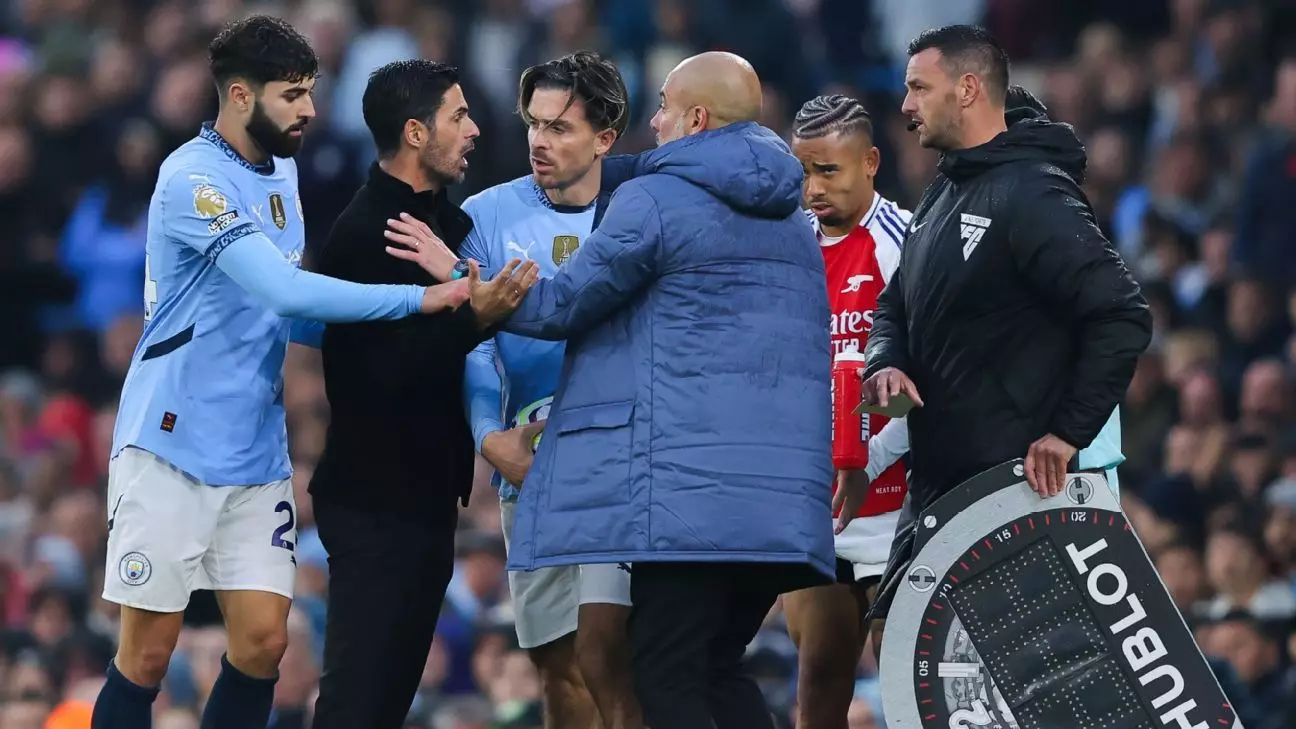The recent 2-2 draw between Arsenal and Manchester City at the Etihad Stadium has ignited a flurry of discussions regarding game tactics, particularly the criticisms aimed at Arsenal from several City players. Mikel Arteta, Arsenal’s manager, has been at the center of these discussions, defending his team’s approach while addressing the implications of injuries within his squad. The dynamics of this football rivalry have heightened the scrutiny surrounding not only the actions of the players on the pitch but also the broader implications of sportsmanship and strategy in today’s game.
The phrase “dark arts” has become a trending topic following the game as City players, including John Stones, Manuel Akanji, and Bernardo Silva, leveled accusations against Arsenal’s tactics. Stones was particularly vocal, describing Arsenal’s methods as “clever or dirty.” These comments highlight a frustrating aspect of sports where teams navigate the fine line between tactical expertise and perceived unsportsmanlike conduct.
Critics argue that such comments often stem from frustration following a challenging match, especially given City’s draw felt like a twist of fate after Arsenal fought doggedly to hold onto their lead with reduced manpower. While some may see Arsenal’s approach as a form of gamesmanship, others, including Arteta, defend it as a necessary adaptation to survive under immense pressure. Arteta’s insistence on relying on “facts” rather than assumptions serves as a reminder that perceptions in football are influenced by outcomes—victories often soften criticism, while losses amplify it.
As the dust settled on the contentious match, Arteta drew attention to a more pressing concern: the injuries plaguing his squad. With Gabriel Martinelli, Jurriën Timber, and Riccardo Calafiori all substituted during the match and goalkeeper David Raya departing with an apparent knee injury, the narrative is further complicated. Arteta’s remarks hint at an urgency within the Arsenal camp, suggesting that injuries could profoundly impact their upcoming fixtures, including their Carabao Cup clash against Bolton Wanderers.
This context shifts the focus back to the integrity of what happens on the pitch. Arteta’s observation that injuries are a genuine concern contrasting directly with allegations of deceitful tactics exposes deeper layers of the game’s ongoing discourse. He implies that the well-being of players should take precedence over accusations of time-wasting tactics, stirring a sense of sympathy for the challenges faced by coaching staff in navigating such crises.
Arteta highlighted the importance of learning from past experiences. His references to previous encounters where Arsenal faced similar challenges illustrate that history often shapes current strategy. The painful memories of a previous 5-0 defeat to Manchester City after a sending-off linger in the mindset of both the players and coaching staff, serving as an impetus for adaptation.
This observation goes beyond just tactical adjustments; it indicates a significant evolution in Arsenal’s mentality and approach to high-stakes matches. Arteta’s insistence that they take lessons from the past signifies a forward-thinking mindset, seeking to forge a resilient identity that can withstand pressure while playing in the Premier League’s intense spotlight.
The verbal sparring off the pitch has also added intrigue to the saga. City striker Erling Haaland’s admonition for Arteta to “stay humble” at the end of the match exemplifies the personal rivalries that color modern football. While some see such exchanges as merely banter, they reveal the underlying tensions that exist as teams jockey for dominance both in the league standings and in public perception.
For Arteta, the request to maintain humility sheds light on the contrast in managerial styles and tactics within the elite tier of football. His composed responses suggest an understanding that humility is a part of the journey, especially when contending with established giants like Manchester City.
Ultimately, the narrative of the Arsenal vs. Manchester City match extends beyond the mere events on the field. It brings to the forefront essential topics such as sportsmanship, injury management, and the mental aspect of a competitive sport. As Mikel Arteta maneuvers through this challenging landscape, one thing becomes clear: the complexities of modern football encapsulate far more than just the game itself; they involve the interplay of strategy, character, and the ever-evolving definition of what it means to compete at the highest level. The discourse triggered by this match will likely resonate as Arsenal continues its season, navigating both successes and setbacks while striving to define its own identity amidst the challenges ahead.

